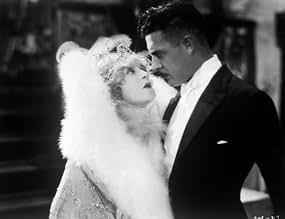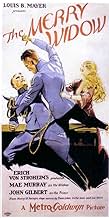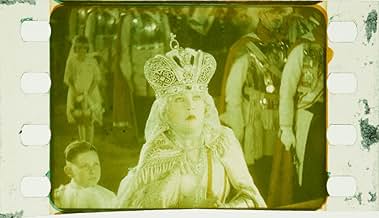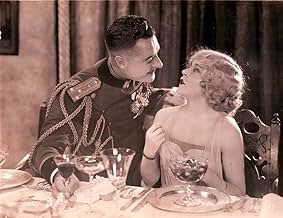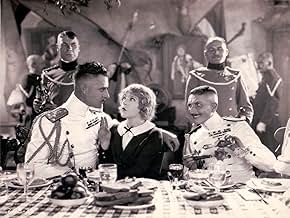NOTE IMDb
7,2/10
2,7 k
MA NOTE
Un prince doit faire la cour à une danseuse désormais riche qu'il a autrefois abandonnée pour garder son argent dans le pays afin d'éviter un effondrement économique.Un prince doit faire la cour à une danseuse désormais riche qu'il a autrefois abandonnée pour garder son argent dans le pays afin d'éviter un effondrement économique.Un prince doit faire la cour à une danseuse désormais riche qu'il a autrefois abandonnée pour garder son argent dans le pays afin d'éviter un effondrement économique.
- Réalisation
- Scénario
- Casting principal
- Récompenses
- 3 victoires au total
Gertrude Bennett
- Hard-Boiled Virginia
- (non crédité)
Bernard Berger
- Boy
- (non crédité)
Sidney Bracey
- Danilo's Footman
- (non crédité)
Estelle Clark
- French Barber
- (non crédité)
Albert Conti
- Danilo's Adjutant
- (non crédité)
D'Arcy Corrigan
- Horatio
- (non crédité)
Joan Crawford
- Ballroom Dancer
- (non crédité)
Xavier Cugat
- Orchestra Leader
- (non crédité)
Anielka Elter
- Blindfolded Musician
- (non crédité)
Dale Fuller
- Sadoja's Chambermaid
- (non crédité)
Clark Gable
- Ballroom Dancer
- (non crédité)
Avis à la une
This is Cheshire, reporting from the 2004 Sydney Film Festival, where Erich von Stroheim's Merry Widow was just given a resounding hurrah! It was the darling of the festival! Never have i heard such hooping and cheering. Our enjoyment of the film was no doubt enhanced by the wonderful print and live piano, violin and brass accompaniment we were treated to.
I know Stroheim only went to Hollywood because he wanted to inject a bit of reality into the movies - and i think he did that superbly with Greed and those pictures before it. But the thing i loved most about Foolish Wives, for instance, my favourite Stroheim film so far (keeping in mind i'm yet to see Blind Husbands), was not how natural and real its performances were, though this was incredible, but Stroheim's wickedly subversive sense of humour. Foolish Wives is divine black comedy - and Merry Widow continues that tradition, not Stroheim's dream of realism. I can't believe Stroheim was depressed at how successful this film was, because he abandoned any attempts at "realism" to make it.
I think he achieves something better. I'm not one of these fellows who insists a picture hold a mirror up to reality to be good - if i was interested in reality, i'd watch a documentary, or perhaps sit on a park bench and watch the thing itself! I go to the pictures to see a different world, with a reality all its own. Its why i love the work of Fellini, the Coen Brothers, David Lynch, Wes Anderson, Kubrick and Co. They give us something better than reality! I think that's what Stroheim does here, and despite the fact that he didn't respect what he did, I think its among his greatest achievements. For modern audiences, The Merry Widow is one of the most delightful pieces of black salacious comedy available before the last twenty years (along with Bunuel's priceless L'Age D'Or). Such intelligent, aware humour - we all had a great laugh at the State Theatre in Sydney.
John Gilbert looks marvelous on screen, and MY what a fantastic actor he was. But the show is all but stolen by Roy D'Arcy, as Stroheim's beloved evil cousin figure. His salacious grin is a thing to behold. He cracked the audience up throughout. Seems D'Arcy is a great unsung hero of the cinema, from looking at his credits list. Perhaps a rediscovery of La Boheme and Bardleys the Magnificent might rejuvenate his memory, not to mention a beautiful DVD edition of The Merry Widow... or even a VHS edition! Who are we kidding here, guys! This is not only one of the most enjoyable silent films i've ever seen, its just a darn tootin' good comedy!
For all the talk of the "boundless shots of shoes" i'd heard were in this movie, i was expecting it to be a two-hour long shoe-store commercial. Whoever went on like that about this movie, including Irving Thalberg, must SO not have even heard of foot fettishism. Its so obvious when you see the picture. There are probably six shots of shoes in the picture total (!), and four of them are to illustrate one of the B-characters as a foot fetishist, which is fairly obvious, since he licks his lips and virtually salivates when he looks at feet! This is also ironic for this character, because his feet are the location of his disability: he walks with comic difficulty on two replacement feet, crutches. The remaining shoe shots are part of a delightful scene involving a game of footsies, which i won't spoil for you, but they are most certainly justified by the narrative.
Look, this is the sort of film i'd love to have on a pretty DVD edition (attention Kino!) as part of the wonderful Erich von Stroheim Collection sitting next to my bed so i can watch it to send me off onto a nice sleep. Its the most fun of Stroheim's films, but he in no way sells out, in my opinion. The humour is satirical, subversive "let's see what i can get away with" comedy - a treat!
For the record, i recommend to you in this order:
1. Foolish Wives 2. The Merry Widow (when its released some time soon, or at a film festival near you) 3. Greed 4. The Wedding March 5. Queen Kelly
(the only other surviving Stroheim picture i'm yet to see is Blind Husbands, and he only directed some scenes from Merry-Go-Round, which you can see on the doco The Man You Love to Hate - they're pretty great!)
I know Stroheim only went to Hollywood because he wanted to inject a bit of reality into the movies - and i think he did that superbly with Greed and those pictures before it. But the thing i loved most about Foolish Wives, for instance, my favourite Stroheim film so far (keeping in mind i'm yet to see Blind Husbands), was not how natural and real its performances were, though this was incredible, but Stroheim's wickedly subversive sense of humour. Foolish Wives is divine black comedy - and Merry Widow continues that tradition, not Stroheim's dream of realism. I can't believe Stroheim was depressed at how successful this film was, because he abandoned any attempts at "realism" to make it.
I think he achieves something better. I'm not one of these fellows who insists a picture hold a mirror up to reality to be good - if i was interested in reality, i'd watch a documentary, or perhaps sit on a park bench and watch the thing itself! I go to the pictures to see a different world, with a reality all its own. Its why i love the work of Fellini, the Coen Brothers, David Lynch, Wes Anderson, Kubrick and Co. They give us something better than reality! I think that's what Stroheim does here, and despite the fact that he didn't respect what he did, I think its among his greatest achievements. For modern audiences, The Merry Widow is one of the most delightful pieces of black salacious comedy available before the last twenty years (along with Bunuel's priceless L'Age D'Or). Such intelligent, aware humour - we all had a great laugh at the State Theatre in Sydney.
John Gilbert looks marvelous on screen, and MY what a fantastic actor he was. But the show is all but stolen by Roy D'Arcy, as Stroheim's beloved evil cousin figure. His salacious grin is a thing to behold. He cracked the audience up throughout. Seems D'Arcy is a great unsung hero of the cinema, from looking at his credits list. Perhaps a rediscovery of La Boheme and Bardleys the Magnificent might rejuvenate his memory, not to mention a beautiful DVD edition of The Merry Widow... or even a VHS edition! Who are we kidding here, guys! This is not only one of the most enjoyable silent films i've ever seen, its just a darn tootin' good comedy!
For all the talk of the "boundless shots of shoes" i'd heard were in this movie, i was expecting it to be a two-hour long shoe-store commercial. Whoever went on like that about this movie, including Irving Thalberg, must SO not have even heard of foot fettishism. Its so obvious when you see the picture. There are probably six shots of shoes in the picture total (!), and four of them are to illustrate one of the B-characters as a foot fetishist, which is fairly obvious, since he licks his lips and virtually salivates when he looks at feet! This is also ironic for this character, because his feet are the location of his disability: he walks with comic difficulty on two replacement feet, crutches. The remaining shoe shots are part of a delightful scene involving a game of footsies, which i won't spoil for you, but they are most certainly justified by the narrative.
Look, this is the sort of film i'd love to have on a pretty DVD edition (attention Kino!) as part of the wonderful Erich von Stroheim Collection sitting next to my bed so i can watch it to send me off onto a nice sleep. Its the most fun of Stroheim's films, but he in no way sells out, in my opinion. The humour is satirical, subversive "let's see what i can get away with" comedy - a treat!
For the record, i recommend to you in this order:
1. Foolish Wives 2. The Merry Widow (when its released some time soon, or at a film festival near you) 3. Greed 4. The Wedding March 5. Queen Kelly
(the only other surviving Stroheim picture i'm yet to see is Blind Husbands, and he only directed some scenes from Merry-Go-Round, which you can see on the doco The Man You Love to Hate - they're pretty great!)
It may be a matter of taste but as much as I like and admire Erich Von Stroheim work before and behind the camera, his reputation as a `genius' doesn't seem justified by the films themselves.
Certainly Merry Widow is filmed with great style and the opulent design is certainly diverting. Also the decision to turn the story from light opera to fairly heavy drama is completely in keeping with Von Stroheim 's own rather cynical outlook. But I find his obsessive dwelling on details can make for a slow and even tedious viewing experience, especially in the first half which seems to spend an inordinate amount of time setting the relationship between the dashing, irreverent but humanist Prince Danilo Petrovich (Gilbert - in wonderful form) and the pompous, tight lipped and distinctly perverse Crown Prince Mirko (Roy D'Arcy).with scenes prolonged far longer than their dramatic weight justifies. Also where the film attempts a lighter tone, the effect is of a concrete soufflé, with every glance and double entendre painfully spelt out.
However this is still a satisfying film as a whole, especially in the second half where we finally have some DRAMA. Here in sequence after sequence we finally start to understand Von Stroheim's reputation as he examines the decaying Royal family under a particularly unflattering microscope. The tryst with the blindfolded musicians is a particularly memorable scene.
Having heard of Mae Murray's terrible treatment of the Von and others in her career, I had a tough time warming to her in this, but I have to admit she gives a great performance as Sally O ' Hara, an innocent who's mistreatment at the hands of the family almost ruins her life. Roy D'Arcy makes an indelible impression as the creepy Mirko, his every gesture filling one with disgust.
But for my money it's Gilbert's work that makes this film worthwhile. One of the very finest of silent actors, the expressiveness of his eyes, the tenderness of his playing and bearing throughout make his character completely convincing and his torment over loosing Sally a felt and poignant loss.
Certainly Merry Widow is filmed with great style and the opulent design is certainly diverting. Also the decision to turn the story from light opera to fairly heavy drama is completely in keeping with Von Stroheim 's own rather cynical outlook. But I find his obsessive dwelling on details can make for a slow and even tedious viewing experience, especially in the first half which seems to spend an inordinate amount of time setting the relationship between the dashing, irreverent but humanist Prince Danilo Petrovich (Gilbert - in wonderful form) and the pompous, tight lipped and distinctly perverse Crown Prince Mirko (Roy D'Arcy).with scenes prolonged far longer than their dramatic weight justifies. Also where the film attempts a lighter tone, the effect is of a concrete soufflé, with every glance and double entendre painfully spelt out.
However this is still a satisfying film as a whole, especially in the second half where we finally have some DRAMA. Here in sequence after sequence we finally start to understand Von Stroheim's reputation as he examines the decaying Royal family under a particularly unflattering microscope. The tryst with the blindfolded musicians is a particularly memorable scene.
Having heard of Mae Murray's terrible treatment of the Von and others in her career, I had a tough time warming to her in this, but I have to admit she gives a great performance as Sally O ' Hara, an innocent who's mistreatment at the hands of the family almost ruins her life. Roy D'Arcy makes an indelible impression as the creepy Mirko, his every gesture filling one with disgust.
But for my money it's Gilbert's work that makes this film worthwhile. One of the very finest of silent actors, the expressiveness of his eyes, the tenderness of his playing and bearing throughout make his character completely convincing and his torment over loosing Sally a felt and poignant loss.
Stroheim's take on the familiar story is filled with his customary pomp and spectacle while never losing sight of the love story at its core. It's something of a slog at over two hours long though, and Gilbert's royal prince comes across as something of a sleaze at times. However, Roy D'Arcy makes a wonderfully hissable villain as the scheming Crown Prince Mirko (a role von Stroheim originally ear-marked for himself).
"Manhattan Follies" dancer Mae Murray (as Sally O'Hara) attracts much male attention while touring the "Kingdom of Monteblanco," especially from sexually aggressive John Gilbert (as Danilo Petrovich) and Roy D'Arcy (as Prince Mirko). Soon, Mr. Gilbert's lunging leers turn to love, and Ms. Murray succumbs to his charms. However, Royal rulers Josephine Crowell (as Queen Milena) and George Fawcett (as King Nikita I) are against Gilbert's proposed marriage. Feeling jilted, Murray marries grotesque banker Tully Marshall (as Sixtus Sadoja), who promptly kicks the bucket. Newly rich, Murray becomes "The Merry Widow" of Paris. There, Mr. D'Arcy seems to win her affections, but Gilbert hasn't given up the courtship.
With this film, big-spending director Erich von Stroheim showed he could make an entertaining and innovative crowd-pleaser; his previous "Greed" (1924) had run over-budget (and over eight hours). But, although they had their hoped-for hit, MGM had also had enough of Mr. Stroheim; still, he departed on a high. "The Merry Widow" also helped rejuvenate Murray's fading career, albeit briefly. The cast is superlative, with D'Arcy essaying one of his most memorable roles. Perfectly representing Stroheim's famous foot fetish, Mr. Marshall is one of silent filmdom's forgotten treasures. Most of all, the flicker put Gilbert on the road to superstardom, which he cemented with a winning performance in "The Big Parade" (later in 1925).
Spotting Clark Gable and Joan Crawford as extras isn't as easy as counting Stroheim's foot references.
******** The Merry Widow (8/26/25) Erich von Stroheim ~ Mae Murray, John Gilbert, Roy D'Arcy, Tully Marshall
With this film, big-spending director Erich von Stroheim showed he could make an entertaining and innovative crowd-pleaser; his previous "Greed" (1924) had run over-budget (and over eight hours). But, although they had their hoped-for hit, MGM had also had enough of Mr. Stroheim; still, he departed on a high. "The Merry Widow" also helped rejuvenate Murray's fading career, albeit briefly. The cast is superlative, with D'Arcy essaying one of his most memorable roles. Perfectly representing Stroheim's famous foot fetish, Mr. Marshall is one of silent filmdom's forgotten treasures. Most of all, the flicker put Gilbert on the road to superstardom, which he cemented with a winning performance in "The Big Parade" (later in 1925).
Spotting Clark Gable and Joan Crawford as extras isn't as easy as counting Stroheim's foot references.
******** The Merry Widow (8/26/25) Erich von Stroheim ~ Mae Murray, John Gilbert, Roy D'Arcy, Tully Marshall
This is the kind of silent film that is so enjoyable to watch. Huge budget with a great cast. In the climatic dance sequence, where the "Merry Widow" dances, both Clark Gable and Myrna Loy, both unknowns at the time, were extras.
Le saviez-vous
- AnecdotesWhile filming the climactic ballroom scene, Erich von Stroheim noticed an extra whose costume was not adjusted to his liking. He stepped off the high camera platform on which he was standing, fell, and broke his leg. He directed the rest of the film from a reclining chair while his leg healed.
- GaffesA title card reads "a prince has a duty to his country higher then [sic] his duty to himself" - a grammatical error unusual for such a prestigious studio as MGM.
- Citations
Prince Danilo Petrovich: Where the devil did you get these pictures?
Danilo's Adjutant: From my barber--he said he got them in Paris.
- Crédits fousThe credits state that the film is "personally directed by" Erich von Stroheim.
- Versions alternativesThe version shown on the Turner Classic Movies (TCM) channel has the musical score arranged by Dennis James and performed by him on a Möller pipe organ. It is shown at a proper silent movie speed and runs 137 minutes.
- ConnexionsEdited into Histoire(s) du cinéma: Seul le cinéma (1994)
Meilleurs choix
Connectez-vous pour évaluer et suivre la liste de favoris afin de recevoir des recommandations personnalisées
- How long is The Merry Widow?Alimenté par Alexa
Détails
- Date de sortie
- Pays d’origine
- Langue
- Aussi connu sous le nom de
- The Merry Widow
- Lieux de tournage
- Sociétés de production
- Voir plus de crédits d'entreprise sur IMDbPro
Box-office
- Budget
- 592 000 $US (estimé)
- Durée2 heures 17 minutes
- Couleur
- Mixage
- Rapport de forme
- 1.33 : 1
Contribuer à cette page
Suggérer une modification ou ajouter du contenu manquant

